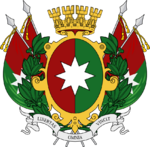Miskism: Difference between revisions
m (→Etymology) |
mNo edit summary |
||
| Line 1: | Line 1: | ||
{{Miskism sidebar}} | {{Miskism sidebar}} | ||
'''Miskism''' ([[Aucurian language|Aucurian]]: ''miškybė'') is the traditional religion of the [[Aucurian people]]. {{wp|Polytheism|Polytheistic}} and {{wp|Animism|animistic}}, Miskism focuses upon a diverse cast of gods and spirits, the ties between the physical and spiritual worlds, and upon human moral obligations to uphold the harmony of reality, known as [[Darna|darna]], in their pursuit of the [[Asmatikslai|asmatikslai]]. It is sometimes called the [[Aucuria|Aucurian]] national religion. | '''Miskism''' ([[Aucurian language|Aucurian]]: ''miškybė'') is the traditional religion of the [[Aucurian people]]. {{wp|Polytheism|Polytheistic}} and {{wp|Animism|animistic}}, Miskism focuses upon a diverse cast of gods and spirits, the ties between the physical and spiritual worlds, and upon human moral obligations to uphold the harmony of reality, known as [[Darna|darna]], in their pursuit of the [[Asmatikslai|asmatikslai]]. It is sometimes called the [[Aucuria|Aucurian]] national religion, though it holds no official status. | ||
[history] | [history] | ||
Revision as of 14:50, 7 March 2019
| Part of a series on |
| Miskism |
|---|
| Religion in Esquarium |
| Beliefs |
| Tradition and practice |
| See also |
Miskism (Aucurian: miškybė) is the traditional religion of the Aucurian people. Polytheistic and animistic, Miskism focuses upon a diverse cast of gods and spirits, the ties between the physical and spiritual worlds, and upon human moral obligations to uphold the harmony of reality, known as darna, in their pursuit of the asmatikslai. It is sometimes called the Aucurian national religion, though it holds no official status.
[history]
[miskism today]
Miskism has traditionally been a major part of Aucurian culture, playing an important role in Aucurian literature, poetry, music, and philosophy. The religion also has strong monastic and mystical traditions.
While philosophical schools known as paražai and associations of Miskist shrines and temples exist, Miskism lacks a centralized religious authority, and different individuals and groups place emphasis upon different theological concepts, scriptures, and holy figures. It is estimated that roughly nine million people are Miskists.
Etymology
Miskism is known by a variety of vernacular names within Aucuria, including senovės takas ("the ancient path"), amžinas takas ("the eternal path"), dievu takas ("the path of the gods"), darnos takas ("the path of darna"), girios takas ("the path of the wilderness"), and miško takas ("the path of the forest"). It is from the lattermost of these that the Aucurian miškybė, and thence the French miskisme, are derived.
Though the religion is now referred to officially as miškybė within Aucuria, the term itself appears to have been a comparatively late development, and is not attested before the 16th century. Some linguists have proposed that it was created in imitation of the names of foreign religions such as Tastanism, Costeny, and Saturnism (tastanybė, kostenybė, and saturnybė in Aucurian).
Beliefs
Darna
Asmatikslai
Deities
Spirits
Saints
Tikrovas
Afterlife
Scriptures
Main traditions
Paražai
Miskism has seven paražai (sing. paražas; "tradition"), of which five are considered "orthodox traditions" (stačiatikiu paražai) and two are considered "heterodox traditions" (nestačiatikiu paražai).
